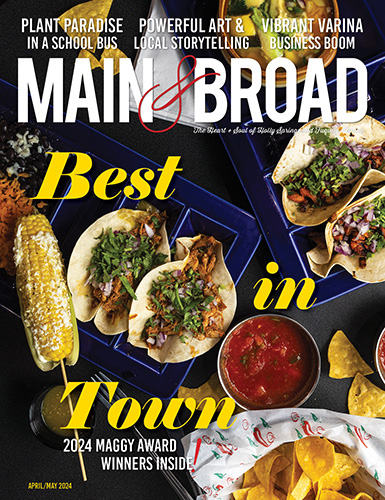Visit the Western Wake Farmers’ Market and you’ll most likely leave with more than you bargained for.
Impulse purchases are hard to resist with the plentiful offerings of produce, meat, cheese, baked goods and other artisan items, but you’re also sure to take home a few lessons that will be around long after those items have been consumed.
 The market is open April through November from 8 a.m.-noon and exists thanks to “a grassroots effort from people concerned about food safety,” according to volunteer Michele McKinley. A group of local moms decided they wanted a place close to home to buy fresh foods produced locally, so they banded together and reached out to vendors to establish the market in Carpenter Village last year.
The market is open April through November from 8 a.m.-noon and exists thanks to “a grassroots effort from people concerned about food safety,” according to volunteer Michele McKinley. A group of local moms decided they wanted a place close to home to buy fresh foods produced locally, so they banded together and reached out to vendors to establish the market in Carpenter Village last year.
Produce sold at grocery stores frequently travels an average of 1,500 miles before hitting the shelves, and it’s often picked early and ripened in transit rather than on the plant. Shipping items so far is hard on the environment, and the quality of the foods suffers too.
All vendors selling at the Western Wake market are located within 125 miles of the marketplace. Most are within about 60-75 miles, but the cutoff was set further out to allow N.C. seafood to be featured as well. Only vendors who have grown or produced their own goods are allowed to sell them, whereas some other area markets allow vendors to buy produce from elsewhere and resell it without revealing its source.
Education is almost as important as the food itself at the market. Each week, educators present information ranging from how-to home gardening advice to the nutritional benefit of local foods to sustainability topics.
“You hear things like, ‘Oh, lycopene is good for you,’” McKinley said, “but you don’t know why.” A quick tour through the market with a nutritionist one week will shed a little light on the nutritional benefits in layman’s terms. Then another week, local chefs like Herons Executive Chef Scott Crawford or Ginger Zucchino, of The Gardener’s Kitchen, will provide tips and ideas for how to get creative with the foods.
 McKinley insists one of the benefits of the market is buying straight from the people who know the most about it. “Shoppers are really appreciating getting to know the people who grow their food,” she noted.
McKinley insists one of the benefits of the market is buying straight from the people who know the most about it. “Shoppers are really appreciating getting to know the people who grow their food,” she noted.
“A lot of people will come up and they’ve never seen something like this and they ask me, ‘What do I do with it?’” said vendor Larry Ballas, of Larry’s Heirloom Gardens. He imports seeds from Italy, India, Asia and elsewhere to produce foods many Caryites have never used before. He believes heirloom varieties of zucchini, eggplant, tomatoes and other vegetables offer a welcome change from the “same old stuff” found in grocery stores.
Another upside to buying local is that all the profits stay in the area economy, supporting people who care deeply about their foods and following sustainable, often very small-scale practices. “I’m not really a farmer. I just do it as a hobby. I do it on less than an acre,” Ballas shared.
Where health is concerned, many consumers value organic foods and meats produced with no hormones. McKinley explains that many farmers follow organic practices but do not have an official organic certification because of the paperwork and expenses involved, which can be impractical for such small farms. Vendors will be happy to discuss the methods that go into producing their foods with people who show an interest.
The spirit of giving has planted its roots deep in the market. The partnership with the Inter-Faith Food Shuttle will continue this year to allow sellers to donate anything they would like to give at the close of the market. New this season will be the Farmer FoodShare effort, which will allow consumers to purchase extra items to give or offer monetary donations to allow market volunteers to select foods to be donated.
 And in an effort to bolster even more giving, the market will participate in the Plant a Row for the Hungry program. Patrons are encouraged to plant a little extra in their home gardens, or just share their bounty when summer’s crops yield more than their kitchens can handle. Items brought to the market will be redistributed to the hungry.
And in an effort to bolster even more giving, the market will participate in the Plant a Row for the Hungry program. Patrons are encouraged to plant a little extra in their home gardens, or just share their bounty when summer’s crops yield more than their kitchens can handle. Items brought to the market will be redistributed to the hungry.
To help those who might not otherwise have the means to purchase fresh, local foods but still want to experience the market atmosphere, The Western Wake Farmers’ Market will be the first in Wake County to accept EBT food stamp payment starting in May. McKinley says the token system involved with making EBT possible will also allow other consumers to shop with credit cards.
Fresh: A Celebration of Local Harvest fundraiser at the Umstead Hotel & Spa May 21 will showcase a variety of local foods prepared by Chef Crawford, plus a silent auction and musical entertainment to raise money for the market. Farmers and artisans will be on hand to share their thoughts on why eating local means eating well.
Visit www.westernwakefarmersmarket.org for tickets, information about the market, links to educational articles and organizations, or to sign up for the weekly Western Wake Eats newsletter.






